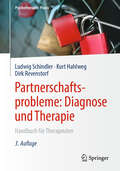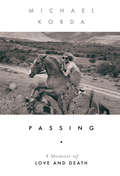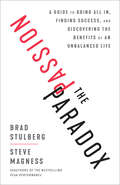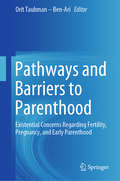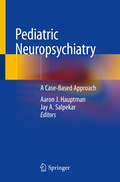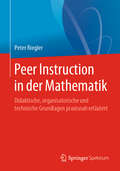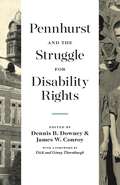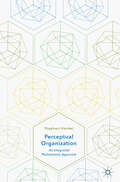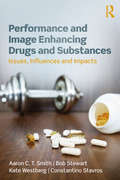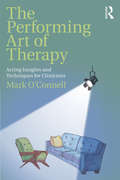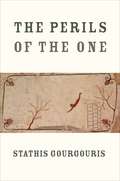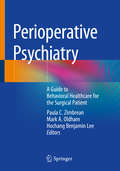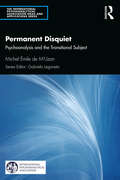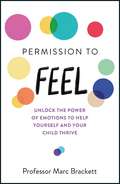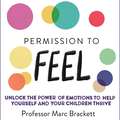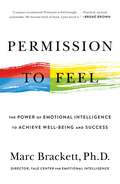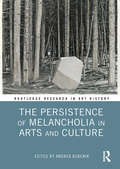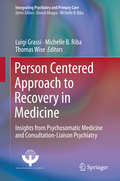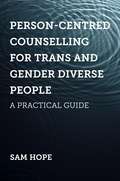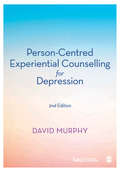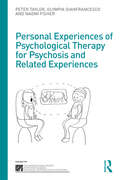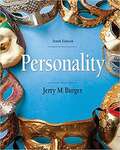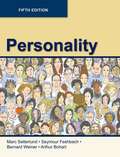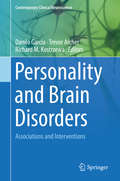- Table View
- List View
Partnerschaftsprobleme: Handbuch für Therapeuten (Psychotherapie: Praxis)
by Ludwig Schindler Kurt Hahlweg Dirk RevenstorfDas Therapieprogramm: Partnerschaftsprobleme nehmen in der therapeutischen Praxis immer mehr Raum ein. Sie wirken sich direkt auf die allgemeine Lebenszufriedenheit aus und können Ursache für neurotische, psychosomatische und psychiatrische Störungen sein. Daher ist das Interesse an Ehe- und Partnerschaftstherapie weiterhin stark angewachsen. Ausgehend vom aktuellen theoretischen Stand der Ehe- und Paartherapie schildern die Autoren praxisnah und verständlich ein umfassendes Therapieprogramm, das nicht zuletzt auf das Training von Kommunikationsfertigkeiten der Paare fokussiert ist.
Passing: A Memoir Of Love And Death
by Michael KordaIn the tradition of The Year of Magical Thinking comes a legendary editor’s unflinching love song about his radiant wife, Margaret, and her battle with cancer. It was a warm April in Pleasant Valley when Margaret Korda, normally a fearless horsewoman, dropped her horsewhip while she was riding. Such a mild slip was easy to ignore, but when other troubling symptoms accumulated, she confided to her husband, “Michael, I think something serious is wrong with me.” Within a few rapid weeks, the fiercely independent, former fashion model was diagnosed with brain cancer, while Michael, once reliant on her steeliness, became her caregiver, deciphering bewildering medical reports and packing her beloved toiletries for the hospital. An operation performed by a renowned surgeon allowed Margaret to ride her favorite competition horse Logan go Bragh a few more times, but Margaret’s tumors quickly returned—leaving her to grapple with the reality of impending death. In rapturous prose, Korda, a modern- day Orpheus, braids her heroic story with heartrending details of their final year together. Passing, a tender memoir, is a testament to the transcendent possibilities of love.
The Passion Paradox: A Guide to Going All In, Finding Success, and Discovering the Benefits of an Unbalanced Life
by Brad Stulberg Steve MagnessThe coauthors of the bestselling Peak Performance dive into the fascinating science behind passion, showing how it can lead to a rich and meaningful life while also illuminating the ways in which it is a double-edged sword. Here’s how to cultivate a passion that will take you to great heights—while minimizing the risk of an equally great fall. Common advice is to find and follow your passion. A life of passion is a good life, or so we are told. But it's not that simple. Rarely is passion something that you just stumble upon, and the same drive that fuels breakthroughs—whether they're athletic, scientific, entrepreneurial, or artistic—can be every bit as destructive as it is productive. Yes, passion can be a wonderful gift, but only if you know how to channel it. If you're not careful, passion can become an awful curse, leading to endless seeking, suffering, and burnout. Brad Stulberg and Steve Magness once again team up, this time to demystify passion, showing readers how they can find and cultivate their passion, sustainably harness its power, and avoid its dangers. They ultimately argue that passion and balance--that other virtue touted by our culture--are incompatible, and that to find your passion, you must lose balance. And that's not always a bad thing. They show readers how to develop the right kind of passion, the kind that lets you achieve great things without ruining your life. Swift, compact, and powerful, this thought-provoking book combines captivating stories of extraordinarily passionate individuals with the latest science on the biological and psychological factors that give rise to—and every bit as important, sustain—passion.
Pathways and Barriers to Parenthood: Existential Concerns Regarding Fertility, Pregnancy, and Early Parenthood
by Orit Taubman – Ben-AriThis volume explores the transition to parenthood from a holistic developmental approach, relating to barriers such as fertility problems and traumatic childbirth, as well as pathways such as positive experiences of pregnancy and childbirth. It presents an extended process, beginning with infertility issues, continuing with subjects pertaining to decisions regarding parenthood, pregnancy and birth, and ending with the early stages of parenthood from a positive psychology perspective. The volume draws on theories of resilience, meaning, terror management, and attachment, and considers psychological, sociological, legal, policy, medical, and therapy issues. It relates to the developmental needs of individuals and couples, as well as to the role played by family, society, and the media, offering a comprehensive in-depth evaluation of the latest topics.
Pediatric Neuropsychiatry: A Case-Based Approach
by Aaron J. Hauptman Jay A. SalpekarAdult neuropsychiatry is now a well-established field with numerous reputable references. Practitioners who work with children routinely note how references and practitioners knowledgeable in the equivalent work in the pediatric world are rare. Child psychiatrists and neurologists frequently work with individuals struggling with these conditions and would strongly benefit from such a reference that incorporates medical work-up, psychopharmacological recommendations, family/support recommendations and theoretical pathophysiology. Pediatricians and developmental pediatricians often treat children with behavioral and neuropsychiatric sequelae, but are not well-trained in the neuropsychiatric management of these cases. Neuropsychologists and educational psychologists working with children and adults with pediatric-onset conditions will also find the text helpful to contextualize their cases, better-understand the medical evaluation and management and perhaps adjust recommendations that would supplement their own testing methods. Finally, sub-specialists in adult neurology, psychiatry and neuropsychiatry often find themselves working with these children by default as there are few pediatric subspecialists who are available to accept them into practice. When facing complex neuropsychiatric illness in children, many clinicians are stymied because they may have “never seen a case like that”. This text fills the wide gap that currently exists and helps move this field forward. The approach utilized in adult neuropsychiatry that is both clear and accessible does not yet have an equivalent in the pediatric realm, but there is tremendous interest in its development. Children and adolescents with neuropsychiatric conditions are very common and they and their caregivers often struggle to find professionals well educated in this field. Ultimately, a wide range of clinicians will find this text to be a very helpful resource for diagnosis and management in the spectrum of pediatric neuropsychiatric conditions. The case-based approach is also unique with respect to neuropsychiatric approaches, and the clear cut, reader-friendly approach of such a format would likely be well-received among physicians looking for a resource on this issue.
Peer Instruction in der Mathematik: Didaktische, organisatorische und technische Grundlagen praxisnah erläutert
by Peter RieglerSie möchten Ihre Lehrveranstaltungen aktivierender und wirksamer gestalten? Sie möchten die Verständnisschwierigkeiten Ihrer Studierenden besser erkennen und verstehen? Sie möchten die studentische Beteiligung steigern, zum Nachdenken und Diskutieren anregen? Lernen Sie das Potenzial von Clickerfragen für die akademische Lehre kennen – damit es bei Ihren Studierenden klick macht! In diesem Buch werden die Grundlagen der interaktiv-dialogischen Lehrmethode praxisnah erläutert. Dabei werden auch häufige Fragen zu didaktischen, organisatorischen und technischen Aspekten beantwortet, etwa:Was ist die Grundidee von Peer Instruction?Wie wirksam ist Peer Instruction? Wie überzeuge ich meine Studierenden davon?Welche technischen Voraussetzungen gibt es?Wie stelle ich gute Clickerfragen?Was sollte ich sonst noch beachten?
Pennhurst and the Struggle for Disability Rights (Keystone Books)
by Dennis B. Downey James W. ConroyConceived in the era of eugenics as a solution to what was termed the “problem of the feeble-minded,” state-operated institutions subjected people with intellectual and developmental disabilities to a life of compulsory incarceration. One of nearly 300 such facilities in the United States, Pennhurst State School and Hospital was initially hailed as a “model institution” but was later revealed to be a nightmare, where medical experimentation and physical and psychological abuse were rampant. At its peak, more than 3,500 residents were confined at Pennhurst, supervised by a staff of fewer than 600.Using a blended narrative of essays and first-person accounts, this history of Pennhurst examines the institution from its founding during an age of Progressive reform to its present-day exploitation as a controversial Halloween attraction. In doing so, it traces a decades-long battle to reform the abhorrent school and hospital and reveals its role as a catalyst for the disability rights movement. Beginning in the 1950s, parent-advocates, social workers, and attorneys joined forces to challenge the dehumanizing conditions at Pennhurst. Their groundbreaking advocacy, accelerated in 1968 by the explosive televised exposé Suffer the Little Children, laid the foundation for lawsuits that transformed American jurisprudence and ended mass institutionalization in the United States. As a result, Pennhurst became a symbolic force in the disability civil rights movement in America and around the world.Extensively researched and featuring the stories of survivors, parents, and advocates, this compelling history will appeal both to those with connections to Pennhurst and to anyone interested in the history of institutionalization and the disability rights movement.
Perceptual Organization: An Integrated Multisensory Approach
by Stephen HandelThis textbook goes beyond introductory sensory perception by incorporating supplementary electronic materials to demonstrate the parallels between both hearing and seeing. Each chapter intermixes seeing and hearing processes so that students can easily understand that perceptual organization is the same across different kinds of sensations and modalities. Figures illustrating visual organization are paired with sound files demonstrating the analogous auditory organization. While most books on sensation and/or perception treat the senses individually there is growing awareness of just how important multisensory integration is to understanding the connection between sensory perception and cognition.
Performance and Image Enhancing Drugs and Substances: Issues, Influences and Impacts
by Aaron Smith Bob Stewart Kate Westberg Constantino StavrosIn the pursuit of more muscle, enhanced strength, sustained endurance and idealised physiques, an increasing number of elite athletes, recreational sport enthusiasts and body-conscious gym-users are turning to performance and image enhancing drugs and substances (PIEDS). In many instances, such use occurs with little regard for the health, social and economic consequences. This book presents a nuanced, evidence-based examination of PIEDS. It provides a classification of PIEDS types, physical impacts, rates of use, user profiles, legal and sporting status, and remedial program interventions, covering both elite and recreational use. It offers the perfect guide to assist students, government policy makers and sport managers in understanding the complex issues surrounding PIEDS consumption.
The Performing Art of Therapy: Acting Insights and Techniques for Clinicians
by Mark O'ConnellThe Performing Art of Therapy explores the myriad ways in which acting techniques can enhance the craft of psychotherapy. The book shows how, by understanding therapy as a performing art, clinicians can supplement their theoretical approach with techniques that fine-tune the ways their bodies, voices, and imaginations engage with and influence their clients. Broken up into accessible chapters focused on specific attributes of performance, and including an appendix of step-by-step exercises for practitioners, this is an essential guidebook for therapists looking to integrate their theoretical training into who they are as individuals, find joy in their work, expand their empathy, increase self-care, and inspire clients to perform their own lives.
The Perils of the One
by Stathis GourgourisFrom the earliest times, societies have been seduced by the temptation of unitary thinking. Recognizing the vulnerability of existence, people and cultures privilege regimes that confer authority on a single entity, a sovereign ruler, a transcendental deity, or an Event, which they embrace with unquestioned devotion. Such obsessions precipitate contempt for the worldliness of real bodies in real time and refusal of responsibility and agency.In The Perils of the One, Stathis Gourgouris offers a philosophical anthropology that confronts the legacy of “monarchical thinking”: the desire to subjugate oneself to unitary principles and structures, whether political, moral, theological, or secular. In wide-ranging essays that are at once poetic and polemical, intellectual and passionate, Gourgouris reads across politics and theology, literary and art criticism, psychoanalysis and feminism in a critique of both political theology and the metaphysics of secularism. He engages with a range of figures from the Apostle Paul and Trinitarian theologians, to La Boétie, Schmitt, and Freud, to contemporary thinkers such as Clastres, Said, Castoriadis, Žižek, Butler, and Irigaray. At once a broad perspective on human history and a detailed examination of our present moment, The Perils of the One offers glimpses of what a counterpolitics of autonomy would look like from anarchic subjectivities that refuse external ideals, resist the allure of command and obedience, and embrace otherness.
Perioperative Psychiatry: A Guide To Behavioral Healthcare For The Surgical Patient
by Paula C. Zimbrean Mark A. Oldham Hochang Benjamin LeeThis book provides a comprehensive review of mental health topics for pre- and postsurgical patients. The book discusses general aspects of psychiatric care during the immediate pre- and postsurgical phase, such as pain management, psychopharmacological management or legal aspects of informed consent. The volume dedicates one section to specific subspecialties, including cardiac surgery, neurosurgery, organ transplantation, plastic surgery, bariatric surgery, and many others. Each of these chapters address preoperative psychiatric risk factors, evaluations, impact, and management recommendations for prevention and treatment of the most common psychiatric complications. The final section reviews the current dilemmas and questions for future research in this field, including delirium and capacity evaluation. The text concludes with commentary written by experts in the fields of consultation-liaison psychiatry and surgery on future directions and considerations. Perioperative Psychiatry is a valuable resource for psychiatrists, psychologists, surgeons, trainees, nurses, social workers, and all medical professionals concerned with the behavioral health of surgical patients.
Permanent Disquiet: Psychoanalysis and the Transitional Subject (The International Psychoanalytical Association Psychoanalytic Ideas and Applications Series)
by Michel De M'UzanPermanent Disquiet: Psychoanalysis and the Transitional Subject comprises the first English language translation of some of Michel Émile de M’Uzan’s key writings, alongside an invaluable glossary by Murielle Gagnebin of M’Uzan’s work. Together, they give a thorough overview of his key thinking. <p><p>The first part of the book sees de M’Uzan exploring the compatibility between creativity (particularly creative writing) and psychoanalytic practice and includes an exchange with Jean-Bertrand Pontalis. The second part focuses on M’Uzan’s key psychoanalytic concept – "permanent disquiet". Freud stated that the purpose of psychoanalysis was to transform neurotic suffering into common unhappiness. De M’Uzan built on this idea in his career and examined what it means for the clinical process for the analyst to step back, not to try and force happiness onto the patient, but instead to accept and allow them to find for themselves their own state of ‘permanent disquiet’. Drawing on Freud and Winnicott and including an invaluable glossary of de M’Uzan’s own psychoanalytic terms, this book brings de M’Uzan’s powerful theory to the anglophone psychoanalytic world for the first time. <p><p>Permanent Disquiet: Psychoanalysis and the Transitional Subject will appeal to psychoanalysts and psychoanalytic psychotherapists globally who are interested in French psychoanalytic thought.
Permission to Feel: Unlock the power of emotions to help yourself and your children thrive
by Marc BrackettA practical and transformative 5-step strategy to ensure the emotional wellbeing of yourself and your childThe mental wellbeing of children and adults is shockingly poor. Marc Brackett, author of Permission to Feel, knows why and what we can do. Marc Brackett is a professor in Yale University's Child Study Center and in his 25 years as an emotion scientist, he has developed a remarkably effective plan to improve the lives of children and adults - a blueprint for understanding our emotions and using them wisely so that they help, rather than hinder, our success and well-being. The core of his approach is a legacy from his childhood, from an astute uncle who gave him permission to feel. He was the first adult who managed to see Marc, listen to him, and recognise the suffering, bullying, and abuse he'd endured. In the decades since, Marc has led large research teams and raised tens of millions of dollars to investigate the roots of emotional wellbeing. His prescription for healthy children (and their parents, teachers, and schools) is a system called RULER, a high-impact and effective approach to understanding and mastering emotions that has already transformed the thousands of schools that have adopted it. RULER has been proven to reduce stress and burnout, improve school climate, and enhance academic achievement. This book is his way to share the strategies and skills with readers around the world. It is tested, and it works.
Permission to Feel: Unlock the power of emotions to help yourself and your children thrive
by Marc BrackettA practical and transformative 5-step strategy to ensure the emotional wellbeing of yourself and your childThe mental wellbeing of children and adults is shockingly poor. Marc Brackett, author of Permission to Feel, knows why and what we can do. Marc Brackett is a professor in Yale University's Child Study Center and in his 25 years as an emotion scientist, he has developed a remarkably effective plan to improve the lives of children and adults - a blueprint for understanding our emotions and using them wisely so that they help, rather than hinder, our success and well-being. The core of his approach is a legacy from his childhood, from an astute uncle who gave him permission to feel. He was the first adult who managed to see Marc, listen to him, and recognise the suffering, bullying, and abuse he'd endured. In the decades since, Marc has led large research teams and raised tens of millions of dollars to investigate the roots of emotional wellbeing. His prescription for healthy children (and their parents, teachers, and schools) is a system called RULER, a high-impact and effective approach to understanding and mastering emotions that has already transformed the thousands of schools that have adopted it. RULER has been proven to reduce stress and burnout, improve school climate, and enhance academic achievement. This book is his way to share the strategies and skills with readers around the world. It is tested, and it works.(P)2019 Macmillan Audio
Permission to Feel: Unlocking the Power of Emotions to Help Our Kids, Ourselves, and Our Society Thrive
by Marc BrackettThe mental well-being of children and adults is shockingly poor. Marc Brackett, author of Permission to Feel, knows why. And he knows what we can do. "We have a crisis on our hands, and its victims are our children."Marc Brackett is a professor in Yale University’s Child Study Center and founding director of the Yale Center for Emotional Intelligence. In his 25 years as an emotion scientist, he has developed a remarkably effective plan to improve the lives of children and adults – a blueprint for understanding our emotions and using them wisely so that they help, rather than hinder, our success and well-being. The core of his approach is a legacy from his childhood, from an astute uncle who gave him permission to feel. He was the first adult who managed to see Marc, listen to him, and recognize the suffering, bullying, and abuse he’d endured. And that was the beginning of Marc’s awareness that what he was going through was temporary. He wasn’t alone, he wasn’t stuck on a timeline, and he wasn’t “wrong” to feel scared, isolated, and angry. Now, best of all, he could do something about it.In the decades since, Marc has led large research teams and raised tens of millions of dollars to investigate the roots of emotional well-being. His prescription for healthy children (and their parents, teachers, and schools) is a system called RULER, a high-impact and fast-effect approach to understanding and mastering emotions that has already transformed the thousands of schools that have adopted it. RULER has been proven to reduce stress and burnout, improve school climate, and enhance academic achievement. This book is the culmination of Marc’s development of RULER and his way to share the strategies and skills with readers around the world. It is tested, and it works.This book combines rigor, science, passion and inspiration in equal parts. Too many children and adults are suffering; they are ashamed of their feelings and emotionally unskilled, but they don’t have to be. Marc Brackett’s life mission is to reverse this course, and this book can show you how.
The Persistence of Melancholia in Arts and Culture (Routledge Research in Art History)
by Andrea BubenikThis book explores the history and continuing relevance of melancholia as an amorphous but richly suggestive theme in literature, music, and visual culture, as well as philosophy and the history of ideas. Inspired by Albrecht Dürer’s engraving Melencolia I (1514)—the first visual representation of artistic melancholy—this volume brings together contributions by scholars from a variety of disciplines. Topics include: Melencolia I and its reception; how melancholia inhabits landscapes, soundscapes, figures and objects; melancholia in medical and psychological contexts; how melancholia both enables and troubles artistic creation; and Sigmund Freud’s essay "Mourning and Melancholia" (1917).
Person Centered Approach to Recovery in Medicine
by Luigi Grassi Michelle B. Riba Thomas WiseThis book offers a resource to aid in implementing psychosocial screening, assessment, and consequently integrating prevention, care and treatment (i.e. pharmacological, psychosocial rehabilitation and psychotherapeutic) in medicine. It is becoming increasingly recognized that one method of combating spiraling health care costs in developed nations is to integrate psychiatric care into medicine including primary care settings. This volume reviews the main issues relative to the paradigm of a person-centered and recovery-oriented approach that should imbue all medical areas and specialties. It proposes integration methods in screening and assessment, clinimetric approach, dignity conserving care, cross-cultural and ethical aspects, treatment and training as a basic and mandatory need of a whole psychosomatic approach bridging the several specialties in medicine. As such, the book addresses a topic that all physicians, including primary care and psychiatric professionals in a wide variety of mental health settings are currently discussing, planning and preoccupied with, namely the task of integrating mental health into all the medical fields, including primary care, cardiology, psychiatry, oncology and so on.
Person-Centred Counselling for Trans and Gender Diverse People: A Practical Guide
by Sam HopeTrans clients are frequently doubted, misunderstood, infantilised and judged by professionals, and this book presents an approach that ensures psychological wellbeing and trust is built between counsellor and client. This person-centred, affirmative approach is based around unlearning assumptions about gender and destabilising professionals' ideas of 'knowing better' than, and judging the client, so that they can forge a relationship and connection that is on an equal footing. The book explores a range of topics such as the overlap of gender diversity and autism, sex and sexuality, intersectionality, unconscious bias and reflective practice. Essential reading for professionals that want to support trans people's mental health and social wellbeing.
Person-Centred Experiential Counselling for Depression: A manual for training and practice
by David MurphyThis practical book focuses on humanistic counselling as an evidence-based psychological intervention and it is an essential read for trainees wishing to work in public health settings. Coverage includes: evidence-based practice and person-centered and experiential therapies the counselling for depression competence framework in-depth case studies illustrating Counselling for Depression in practice training, supervision and research The book also includes research data supporting the approach, and sources used in developing the humanistic competence framework. Vital reading for those taking counselling for depression training or a humanistic counselling and psychotherapy course, as well as for those already working within the NHS and wish to enhance their practice.
Person-Centred Experiential Counselling for Depression: A manual for training and practice
by David MurphyThis practical book focuses on humanistic counselling as an evidence-based psychological intervention and it is an essential read for trainees wishing to work in public health settings. Coverage includes: evidence-based practice and person-centered and experiential therapies the counselling for depression competence framework in-depth case studies illustrating Counselling for Depression in practice training, supervision and research The book also includes research data supporting the approach, and sources used in developing the humanistic competence framework. Vital reading for those taking counselling for depression training or a humanistic counselling and psychotherapy course, as well as for those already working within the NHS and wish to enhance their practice.
Personal Experiences of Psychological Therapy for Psychosis and Related Experiences (The International Society for Psychological and Social Approaches to Psychosis Book Series)
by Peter Taylor Olympia Gianfrancesco Naomi FisherFor those struggling with experiences of psychosis, therapy can be beneficial and even life changing. However, there is no single type of therapy, and a great range and diversity of therapeutic approaches have been developed to help different individuals’ needs, which makes deciding which approach is most helpful for an individual not a straightforward choice. Personal Experiences of Psychological Therapy for Psychosis and Related Experiences uniquely presents personal accounts of those who have received therapy for psychosis alongside professional clinical commentary on these therapies, giving multiple perspectives on what they involve and how they work. Presented in a clear and accessible way, each chapter includes accounts of a variety of different therapies, including cognitive behavioural therapy, trauma-focused therapy, open dialogue, and systemic family therapy. The reader is encouraged to explore not only the clinical basis for these therapies but also understand what the treatments mean for the person experiencing them, as well as their challenges and limitations. The book also explores the importance of the individual’s relationship with the therapist. As a whole, the perspectives presented here provide unique insight into a range of widely used psychological therapies for psychosis. With its special combination of personal experiences and concise introductions to different therapies, this book offers a valuable resource for academics and students of psychiatry, clinical psychology, psychotherapy, mental health care and mental health nursing. It will also be essential reading for those considering treatment, their friends and families, as well as mental health professionals, including psychiatrists, clinical psychologists, psychotherapists and nurses.
Personality (Mindtap Course List Ser.)
by Jerry M. BurgerHow would you describe your personality, or can you? Whatever your answer, this text will help you understand personality -- the qualities and traits that form every individual's distinctive character. You'll learn about theoretical explanations of personality, and about the research that illuminates how those theories are relevant in the world around you. Biographical sketches of theorists and accounts of the stories behind influential research programs help you see how classic and contemporary findings relate to each other, and illustrate the connection between theory and research. As you read, personality tests encourage you to interact with the material -- and learn more about your own personality.
Personality
by Marc Setterlund Seymour Feshbach Bernard Weiner Arthur BohartPersonality, 5E,is a student friendly and accessible text for undergraduates at two and four-year colleges, assuming no background in psychology. This eclectic, empirical, and comprehensive text covers classic topics such as learning, the humanistic and the psychoanalytic approaches, as well as a fresh examination of topics such as traits, genetics, culture, and the self. This text explores the influence of identity, development, nature, and nurture on personality. The text discusses personality in the context of emotion, stress, love, and aggression. The authors compare major theories of personality, and discuss personality processes and dynamics.
Personality and Brain Disorders: Associations and Interventions (Contemporary Clinical Neuroscience)
by Richard M. Kostrzewa Trevor Archer Danilo GarciaBrain disorders (neurodevelopmental, neurodegenerative, and affective disorders) can be investigated, treated, and prevented using person-centered methods. Because researchers have not reached a clear consensus on whether or not personality is stable or changeable, it has been difficult to outline how to use these methods in the care of people with brain disorders. Thus, the first part aims to identify the ways in which brain disorders and personality are linked. The second part explores different person-centered approaches that can be incorporated in a healthcare or education setting to help people with various brain disorders and to promote physical, mental and social health. The third part focuses on challenges and new venues.
